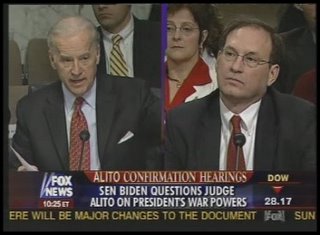More from the Princeton-"Loving" Senator

Even though Teddy Kennedy disgusts me, since I picked on Senator Biden earlier, I might as well continue with the theme of Biden-bashing. Richard Cohen of the Washington Post is a friend of Biden's. See what he had to say over the Confirmation Hearings and Biden's performance. My favorite line: "His achilles heel is his mouth."
Yesterday, Joe Biden was grilled hard by Katie Couric on The Today Show.
I heard Hugh Hewitt's assessment of it, before having to go into work. I'm glad Radioblogger had the transcript, and I'm reproducing it here:
Just when you thought Joe Biden stopped digging...
It's been a bad week for the senior Senator from Delaware. And it's about to get worse.
This morning, at 7:04AM Eastern time, Senator Biden appeared with Katie Couric on the Today Show for about eight minutes. Katie grilled Biden over the personal attacks by some on the Judiciary Committee, causing Mrs. Alito to leave the hearing yesterday in tears. Biden immediately deflects, saying he wasn't in the room when she cried, and saying the system (the hearing process into judicial nominees) has broken down.
First of all, for Joe Biden to say the system has broken down is like an arsonist coming out of a burning building with a spent match in his hands, saying wood is bad because it's flammable. But I digress.
As an example of why the system has broken down, he offered the following quote:
JB: The fact is that I think what's happened here is the system is kind of broken, Katie. Every nominee comes forward, like in the New York Times today, and says a partisan volly seemed to sail over the judge, who routinely and resolutely declined to be drawn into a discussion about executive privilege, etc. The whole point here is that nominees now, Democrat and Republican nominees, come before the United States Congress, and resolve not to let the people know what they thing about the important issues. And the real issue is, do the American people have a right to know? This thing about executive privilege, do the people have a right to know whether or not President Bush is able to go to war in Iran without Congressional approval, which his administration argues. That's a pretty basic subject. Do they have that right? Well, it seems to me a judge before us should say, well I think the Constitution says he does or he doesn't, as opposed to saying he's bound by the Constitution.
Biden's question here, actually, is a good one. And moreover, it's concise for a change. But Biden's complaining that the judge ought to answer it in a certain way, instead of answering it as saying he's bound by the Constitution. If you haven't watched all of the hearings, you would read this and conclude that Biden had asked the judge this question, and the judge ducked his answer, therefore frustrating the Senators, making them press harder, and therefore making the nice lady cry.
Here's the problem. This interview with Katie Couric again was over by 7:12AM Eastern time, so he could catch the Amtrak from Wilmington to Union Station in Washington in time for the hearings. Check out the time stamp in the lower corner.

Three hours later, in Round 4 of the hearings, Biden finally got around to asking the question he used as a defense to Couric three hours earlier. Again, check out the time stamp.

Here's what he asked him.
JB: There's a great debate now of whether or not the administration's internal position is correct. And that is the president has the authority to go to war absent Congressional authorization. And it was a claim made by Bush I, and then dropped. Bush I argued that the only reason the declare war provision is in the Constitution is to give the president the authority to go to war if the president didn't want to. That was the claim made. Similar claim made here. So I want to ask you a question. Do you think the president has the authority to invade Iran tomorrow without getting permission from the United States Congress, absent him being able to show there's an immediate threat to our national security?
Again, a brief aside, why would Bush invade Iran tomorrow, unless there was an immediate threat to our national security? Doesn't that last line by Biden make his whole point ridiculous? Is he saying he's worried about the president of the United States invading a country just for the hell of it? Has Biden joined the Michael Moore/Cindy Sheehan nutter caucus?
But go back to the question. Biden had half an hour on Monday in his opening remarks. He had a half hour with the judge on Tuesday. He had twenty minutes with him on Wednesday. He gets grilled by a usually friendly Couric on the Today Show, and he deflects by citing a question and answer set that he wouldn't get a chance to ask for three more hours.
When the question finally was asked, did Judge Alito say he's bound by the Constitution, as Biden told Couric he was? Nope. Here is what Alito said.
SA: Well, that's a question that I don't think is settled by the whole issue of...the extent of the president's authority to authorize the use of military force without Congressional approval has been the subject of a lot of debate. The Constitution divides the powers relating to making war between the president and the Congress. It gives Congress the power to declare war, and obviously that means something. It gives Congress the power of the purse, and obviously, military operations can't be carried out for any length of time without Congressional appropriations. Congress is given the power to raise and support an army, to maintain a navy, to make the rules for governing the land and the naval forces. The president has the power of the commander in chief. And I think there's been general agreement, and the Prize Cases support the authority of the president to take military action on his own, in the case of an emergency, when there is not time for Congress to react.
JB: Is that the deciding question, if the Congress does not have the time to act?
SA: Well, the Prize Cases, I think, are read to go as far as to say that in that limited circumstance, the president can act without Congressional approval. A lot of scholars say that what's important, as far as Congressional approval, is not the form. It's not whether it's a formal declaration of war or not. It's whether there is authorization in one form or another. The War Powers resolution was obviously an expression of the view on the part of Congress...
Biden then pressed him by asking what Alito personally thought of the legality of Bush invading Syria or Iran tomorrow, because it seemed like Alito was giving that impression. Here's the rest of Alito's answer.
SA: Well, I hope I'm not giving you that impression, Senator, because I didn't mean to say that. I have not read Professor Yoo's book, or anything that he or anyone else has written, setting out the theory that you've described. I have been trying to describe what I understand the authorities to say in this area. Generally, when this issue has come up, or variations of this issue have come up, to a number of recent wars, there were a number of efforts to raise issues relating to this, in relation to the war in Vietnam. There was an effort to raise it in relation to our military operations in the former Yugoslavia. In most of those instances, the cases were dismissed by the lower courts under the so-called political question doctrine that I described earlier.
But Biden tried again. He wanted to know what Judge Alito the man thinks about the idea of Bush invading Iran tomorrow. He tried to ask Judge Alito as a citizen what he though. Here's what Judge Alito's answer was:
SA: And Senator, if I'm confirmed, and if this comes before me, or perhaps it could come before me on the Court of Appeals, the first issue would be the political question doctrine that I've described. But if we were to get beyond that, what I can tell you is that I don't have...I have not studied these authorities, and it is not my practice to just express an opinion on a Constitutional question, including particularly, one that is as momentous as this. I've set out my understanding of what the Constitution does in allocating powers relating to war between the executive and Congress, and what some of the leading authorities have said on this question. But beyond that, I haven't read Professor Yoo's book, or anything that he's written on this issue. I would have to study the question.
In other words, he answered exactly as you would expect or want a nominee to the Supreme Court to answer.
As for Biden, is he so punchdrunk this week that he thinks no one's watching him, or listening to what he says? It's not rocket science to look at time codes on Tivo and realize that unless he's discovered the secrets to time travel, he was talking out of his rear end again this morning on television.
Special thanks goes out to my pal Derek for his very capable research. -Hugh Hewitt





0 Comments:
Post a Comment
<< Home